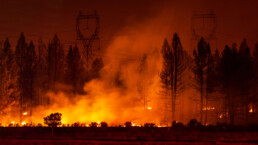Ecological crisis, rural deindustrialization, and real estate speculation have created conditions in which the far right thrives.
by Patrick Bigger and Sara Nelson, Dissent
Late in the summer of 2020, forests across the western United States were on fire. In that year alone, California experienced six of the twenty largest fires in its recorded history, including the North Complex Fire, which killed sixteen people and burned more than 300,000 acres. Further north, the Beachie Creek and Lionshead fires merged near the Oregon-Washington border, ultimately burning more than 600 square miles (an area roughly half the size of Rhode Island) and killing five people. Across the West, more than 10 million acres burned—the second-highest annual figure since record-keeping began—incurring $18.9 billion in economic losses and firefighting costs.
In the febrile atmosphere of the looming presidential election and nationwide racial justice protests, the fire crisis pushed some Oregon reactionaries into action. Rumors quickly spread that Portland-based anti-fascists and Black Lives Matter organizers were setting fires to punish their rural (white) enemies and then looting evacuated areas. These rumors were boosted across social media and by a QAnon “drop,” leading militia members to set up armed checkpoints to search for arsonists. While the militias failed to turn up any antifa arsonists, they did offer a kind of social response—albeit paranoid, violent, and exclusionary—to the effects of climate change. It’s a response that risks becoming more common as the ecological crisis deepens.

The scope and urgency of the wildfire crisis in the U.S. West are forcing communities and governments to respond, but the ultimate form of the response is yet to be determined. Milton Friedman infamously quipped that “when [a] crisis occurs, the actions that are taken depend on the ideas that are lying around.” Gaps in state action have left at-risk communities to formulate their own theories about the causes and consequences of socio-ecological breakdown, and as the far right surges across the rural West, it is leaving plenty of warped ideas “lying around.” Strange mutations and alignments are starting to take shape among different factions of the right, including Trumpist Republicans, libertarian localists, and eco-fascists, against this backdrop of punishing environmental change—and in many cases they are starting to take power.
Recent Posts
‘Unconstitutional. Unethical. Authoritarian.’ ICE Bars Millions Of Immigrants From Bond Hearings
July 18, 2025
Take Action Now One watchdog said the new policy “seems like a blatant attempt to stop them from exercising their right to due process.”……
Americans Are Not Nearly Alarmed Enough About Climate Change
July 18, 2025
Take Action Now Americans still don’t comprehend how imminent, dangerous, and far-reaching the threat is—and journalists are partly to blame.By…
The IRS Is Building A Vast System To Share Millions Of Taxpayers’ Data With ICE
July 17, 2025
Take Action Now ProPublica has obtained the blueprint for the Trump administration’s unprecedented plan to turn over IRS records to Homeland Security…
Israel’s Sudden Assault On Syria Is Unchecked Aggression
July 17, 2025
Take Action Now Jerusalem is bombing Damascus and threatening al-Sharaa’s rule, while Washington was hoping to help the nascent government on…




